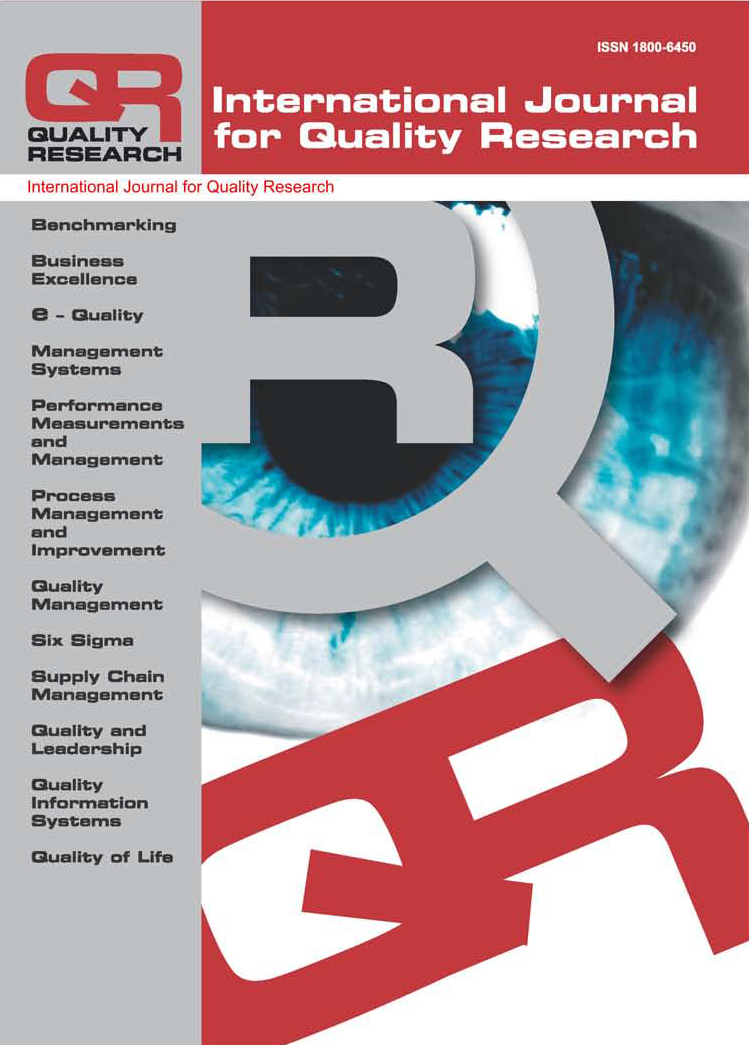SEARCH KEYWORD: Tadeja Jere Jakulin
Number of results: 9
1. Tilen Albreht Centrih, Tilen Nipič, Žan Hodžič, Tadeja Jere Jakulin
HOSPITALITY 2.0: HOW THE IMPLEMENTATION OF TECHNOLOGY IN THE HOSPITALITY INDUSTRY AFFECTS THE PERCEPTION OF HOSPITALITY
Abstract: In today's world, technology is increasingly involved in the tourism industry, which is facing a transformation that fundamentally changes the concept of hospitality. The traditional understanding of hospitality, based on personal contact, warmth, and an individual approach, faces new challenges and opportunities brought about by technological innovation. This paper explores the impact of these technological changes on the perception of hospitality in the hospitality industry, considering both positive and negative effects. The research adopted qualitative methods, focusing on descriptive and analytical study of the theoretical literature and system dynamics model, which shows the interdependencies of hospitality's essential elements. The results contribute to a better understanding of how technology is changing hospitality in the hospitality industry and provide insights into how the sector can find the right balance between using technological innovation and preserving the human element at the heart of genuine hospitality.
Keywords: Performance management, Performance measurement, Quality management, ISO 9001, System dynamics
DOI: 10.24874/IJQR19.02-20
2. Žan Hodžič, Tilen Albreht Centrih, Tilen Nipič, Tadeja Jere Jakulin
HARMONISING ARISTOTLE'S VIRTUES: IMPROVING THE QUALITY OF LIFE IN ACCESSIBLE TOURISM THROUGH THE LENS OF HOSPITALITY
Abstract: The paper explores the intersection of accessibility, hospitality, and the rights of people with disabilities in the tourism environment. It employs a mixed methodological approach, including literature review, document analysis, expert interviews, statistical data analysis, and system dynamics modelling, to shed light on the challenges and opportunities in accessible tourism. The study underscores the need to foster inclusive environments in tourism, drawing on Aristotle's concept of equity, which advocates for the fair and equitable distribution of resources and opportunities as the basis for creating good for others. The built CLD model, a testament to the enduring relevance of classical human values in the context of eudaemonia-quality of life and tourism, presents solutions for a future of human systems thinking where equal opportunities, the overall tourism experience, the experience of people with disabilities, and the quality of life are significantly improved.
Keywords: Accessible tourism, Quality of life, Hospitality, Nichomaean ethics, System dynamics modelling
DOI: 10.24874/IJQR19.02-11
3. Rudi Čop, Tadeja Jere Jakulin, Franc Šturm, Vlado Rosa
UNVEILING THE IMPACT OF THE ETERNAL LUNAR CALENDAR ON QUALITY OF LIFE
Abstract: The lunar calendar is the first one established in history. The lunar calendar gives nature's weekly and monthly changes more precisely than the solar one. In restoring such a calendar, we distinguished between proven facts and hypotheses and legends, which were preserved with the help of records based on the testimony of individuals who lived in northwestern Slovenia during the first part of the 20th century. Their eternal lunar calendar is said to be over 300 years old. Its users believed in the initial force, which, according to them, governs everything that exists in this world. Considering the natural cycles increases the quality of our life and ensures its longest possible length.
Keywords: time measurement, base-sixty number system, eternal lunar calendar, Nature Worship in the Western Slovenia
DOI: 10.24874/IJQR18.03-03
4. Tadeja Jere Jakulin
MEASURING THE IMPACT OF COLOURED OILS ON THE HUMAN BODY AND THEIR POTENTIAL IN WELLNESS AND SPA TOURISM
Abstract: The paper explores how colours can underpin critical research in people's well-being and life. Following a brief introduction to the principles of colours and Colour Mirrors system, the paper elaborates on how the coloured oils and essences' principles can drive healing and well-being in a spa, wellness, and life. We used EMADEL (emission-absorption near-electric field detection of biofield) in the experiments. This method measures the organisms' response to near-field exposure markedly different from the expected behaviour. As the second method, we used Bio-resonance, where the researcher uses a device to analyse the person's electromagnetic waves and alter them before returning them to the body.
Keywords: Colours, Colour Mirrors System, EMADEL, Bio-resonance, Wellness & Spa Tourism.
DOI: 10.24874/IJQR17.01-15
5. Rudi Čop, Tadeja Jere Jakulin
THE INFLUENCE OF THE SUN ON OUR LIVES
Abstract: The paper first introduces the sunspot cycles and discusses the relationship between the solar cycles and the 12?year Chinese calendar. The latter has a significant impact on the lives and thinking of some East Asian countries and the emigrants from those countries. Western civilization considers solar cycles and their impact on human life only as solar astronomy and geomagnetism. Through the established effects on life on Earth, the life span of an individual is the starting point through which the paper represents the long-term influence of the Sun on us.
Keywords: Solar cycles, Geomagnetic Field, Impact on the biosphere, Chinese zodiac, Impacts on humans and human society
DOI: 10.24874/IJQR16.03-03
6. Pooyan Sedarati, Francisco Manuel Dionísio Serra, Tadeja Jere Jakulin
SYSTEMS APPROACH TO MODEL SMART TOURISM ECOSYSTEMS
Abstract: The tourism industry is inherently complex and a key player in sustainable development. This paper intends to discuss the path towards building a sustainable smart tourism ecosystem model by delving deep into the pivotal topics with interesting speculations on smart cities' perspectives that lay a broader foundation of smart tourism destinations. First, it discusses the interconnections and foundation of smart tourism ecosystems by proposing a general conceptual model describing traditional tourism transformation through ICTs. Second, by explicating each building block of smart tourism ecosystems and using systems methodology (systems thinking method and qualitative modeling in a frame of system dynamics) to break down the complex system of smart tourism's roles and components. Such methods are widely utilized in different fields of study to facilitate the decision-making process by furnishing a holistic view of the problem. For that matter, Causal Loop Diagramming (CLDs) was used as one of the powerful tools of systems thinking to depict smart tourism ecosystems. The proposed causal loop diagram considers sustainability as one of the main concerns and trying to shed some light on intricate networks of businesses, socio-economic, and environmental subsystems in smart tourism destinations that are performing distinctively yet interdependent. This study is an ongoing process employing System Dynamics (SD) methodology for model testing and validation.
Keywords: Smart Tourism Destinations; Smart Ecosystems; Sustainable Tourism; Complex Systems; Systems Methodology
DOI: 10.24874/IJQR16.01-20
7. Marko Kukanja, Tanja Planinc, Tadeja Jere Jakulin
RESTAURANT MANAGERS' PERCEPTIONS OF SERVICE QUALITY: THE MEDIATING ROLE OF RESTAURANT SIZE AND SEATING CAPACITY
Abstract: The aim of this study was to analyse which quality attributes are, according to managers' beliefs, the most important in determining overall service quality, as well as to investigate the relative importance of restaurant size (square meters) and seating capacity (number of seats) on managers' perceptions of restaurant quality. The sample was composed of 148 managers of individually operating restaurant SMEs in Slovenia. The DINESERV instrument was applied to measure managers' perceptions of service quality. Exploratory factor analysis was used to analyse the importance of different quality attributes, and confirmatory factor analysis (SEM) was used to investigate the impact of restaurant size and seating capacity on managers' perceptions of quality. Results revealed that only twelve quality items belonging to three quality attributes - Assurance, Empathy, and Tangibles - are important in determining restaurants' service quality. The identified three quality attributes explained 56.65% of managers' perceptions of service quality. Results also showed that restaurant size and number of seats significantly influence managers' perceptions of service quality. These results are of great important for restaurant managers aiming to improve their service quality.
Keywords: Restaurant industry, Quality management, Managers' perceptions, DINESERV, Slovenia
DOI: 10.24874/IJQR14.01-15
8. Tadeja Jere Jakulin, Rudi Čop
SUNSPOT CYCLES IMPACTS ON TOURISM AND QUALITY OF LIFE
Abstract: We live under the influence of natural cycles caused by the rotation of our planet and its revolution around the sun. The nature of our nearest star is also subject to cyclical change. This article presents a study of a correlation between sunspot cycles and foreign tourists arrivals in Slovenia, based on historical data between sunspot cycles and sea salt production in Slovenia's Municipality of Piran during the Maunder Minimum period (1645-1715). The production of salt by the solar evaporation of brine in salt pans and tourist industry are seasonal economic activities that are affected by changes to the weather. The paper looks at sea salt production in Piran during a particular period in the past. The repetition of the sea salt production in the past is not possible. For this reason, the study uses mathematical tools and an additional case study, which analyses arrivals of foreign tourists to Slovenia over the past 65 years (1948-2012). The study has two purposes: to identify a linear correlation coefficient, which provides evidence of a correlation between arrivals of foreign tourists to Slovenia and sunspot cycles and to develop a causal loop diagram (CLD) or so called qualitative model of a complex tourism system, which shows the interdependency of sunspot cycles, tourism system, and quality of life.
Keywords: sunspot cycles, Maunder minimum, foreign tourist arrivals, CLD modelling, quality of life
DOI: 10.18421/IJQR11.03-14
9. Tadeja Jere Jakulin
SYSTEMS APPROACH FOR CONTEMPORARY COMPLEX TOURISM SYSTEMS
Abstract: Systems approach represents thinking outside the box and is connected to the transformation of common linear approach and thinking. Western society followed rules of classical western science, which form many centuries took analysis as mainstream of thinking and researching. One can find perfect and logical explanation for this. In the past, classical science researched matter and reached optimal results with analysis and analytical thinking. Nowadays more and more scientists research intangible world around matter and cooperate with prevailed, fastest growing service industry such as tourism. Following paper presents systems approach in tourism, which defines wideness, co-dependency among tourism system elements, and "big picture" point of view. In a frame of systems methodology, we will show the importance of systems approach in order to understand complexity in the area of tourism. At once an excellent example of the analytical approach will be shown in so called "the tip of the iceberg" theory, where events represent analytical thinking and structure or base of the iceberg represents systems approach. Complexity of the tourism systems will be explained and a model of a common tourism system developed. We claim that the analysis, in the past, caused technological progress; it caused the development of western science, which we now know it. It led to the discoveries but for dealing with contemporary complex challenges is not sufficient. Today a systems approach is suitable enough for dealing with complex question in the area of tourism and of course in global society.
Keywords: systems approach, tip of the iceberg, modelling, tourism, "the big picture", co-creative society
DOI: 10.18421/IJQR10.03-05







